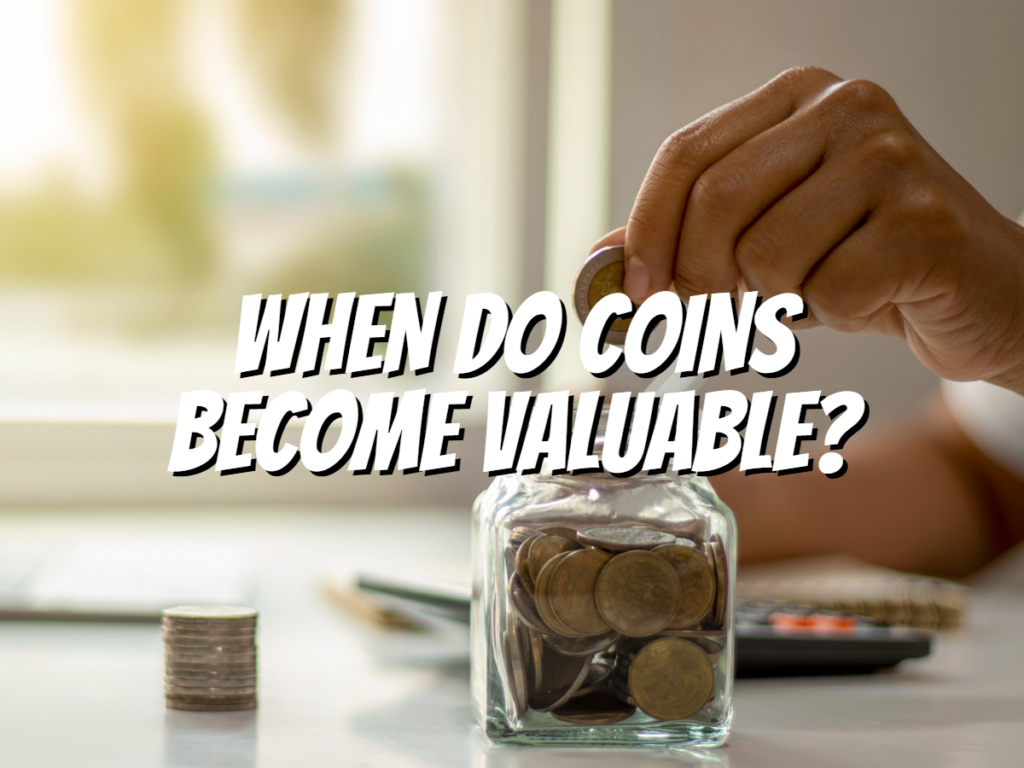If you’re like me and have a drawer full of coins, these pieces of metal might not seem like much.
But if you know what to look for and how to determine whether or not they’re worth something, you could be sitting on a gold mine.
When Do Coins Become Valuable?

The answer is that coins can become valuable at any time. The key is knowing the value of your coin and what makes it valuable.
The value of a coin depends on its condition, rarity, and metal composition.
Coins with low mintage or rare figures may be worth more than others in similar conditions.
For example, if you own 10 Morgan dollars but know that there were only 5 million coins minted during their run, then yours will likely be worth more than other Morgans in similar conditions.
How Does Rarity Affect Coin’s Value?
Rarity and availability are the two main factors determining a coin’s value.
If a coin is rare and in high demand, it will be more valuable than another coin with the same amount of precious metal content.
If you’re looking for coins likely to be valuable over time, look for those with low mintages (the number of coins produced) or minted in small quantities.
You should also watch for “first strikes,” or those coins struck during their first year of production.
First strikes can sometimes command high premiums thanks to their scarcity, which makes them appealing to collectors and investors alike.
How Does Condition Affect Coin’s Value?

The condition of a coin affects its price, not its value. Therefore, better-quality coins are generally worth more than those in poor condition.
However, coins with average wear can be challenging to sell at a reasonable price.
A coin’s grade indicates how much wear and tear it has suffered over time.
Coins can be graded on a scale from 1 through 70, with the lower grades being less valuable than the higher ones (1 being the lowest).
Although it may seem counterintuitive that there is no such thing as a “perfect” coin because human hands will have touched it at some point, consider this: if you were going out into the world and buying things with your money, would you rather have $100 worth of new $20 bills or $100 worth of used $20 bills?
Of course, you should take the new ones because they’re cleaner and look nicer!
How Does Metal Composition Affect Coin’s Value?
The metal composition of a coin can play a significant role in its value.
The most common metals used are copper, silver, and gold. The US Mint circulated coins made of copper (valued at $1) between 1864 and 1873.
These coins have low value because they’re made from base materials that are difficult to melt down; however, if you find an older “copper” penny with no date on it, it may be worth more than $3 because this is an error coin produced before the changeover from “copper” pennies to zinc-based ones in 1982.
Coins made of silver have a higher value than base metals like copper or nickel because they contain precious metals such as silver or gold (valued at $10).
In addition to having lower production costs than other coins due to their composition, these types also require less energy than other materials during production processes – meaning they could last longer than others!
It’s important when buying one, though: make sure it isn’t just plated over another material since this wouldn’t reflect its true worth if so.”
How Does Age Affect Coin’s Value?

The age of a coin is one of many factors that affect its value. Many factors determine a coin’s value, and you must consider them when determining what an item is worth. A coin’s age does make it more valuable, but not by much.
Most collectors will pay less for old coins because they have lost their original luster and beauty.
As time passes, many older coins lose some of their lusters and become duller in appearance due to oxidation or other factors like wear and tear from handling them over time.
Do All Old Coins Become Valuable?
Not all old coins are valuable. This is a common misconception among hobbyists and new collectors, who often assume that if an item is old enough, it will be worth something.
But this isn’t always the case! Some coins are rare and valuable, but not necessarily because they’re ancient.
A coin can be tough to find without being particularly old or expensive—it depends on how many were made and what condition they’re in (or whether there are any survivors).
The more scarce something is, the more likely it’ll fetch a high price when sold at auction or through other means of exchange like eBay or Craigslist.
Takeaway:
- Rare coins are worth more than common coins because they’re difficult to find. These can include coins minted in limited quantities and never circulated or spent.
- Condition, or the state of preservation of a coin, also greatly affects its value. For example, a coin worn down over time may have little value if it has no collector’s appeal compared to one in mint condition.
- The metal composition used for making a coin is essential because it determines what materials can be added later to enhance its appearance or improve its quality. Of course, some metals are better suited for this purpose than others, so you should always check what kind of metal you have before deciding whether it needs any enhancements done on it or not.
- Many collectors prefer coins that were never circulated but minted as collector’s items. These are often valued more highly than coins used in commerce and may date back hundreds of years.
- It’s important to understand that not all old coins will become valuable. The best way to know if your coin is worth something is by looking at its condition, metal composition, and other factors that can affect its value.
Before you go…
So there you have it! I hope this article has helped you answer your questions! It’s important to understand that factors affect a coin’s value. So if you have rare coins in your collection, ensure their safety so they wouldn’t get damaged and depreciate! If you have any suggestions about topics to cover, don’t hesitate to leave them in the comment section!
Check out my next article: “Why are Coins so Valuable? 5 Factors That Affect Coin’s Value.”
Related Articles:

